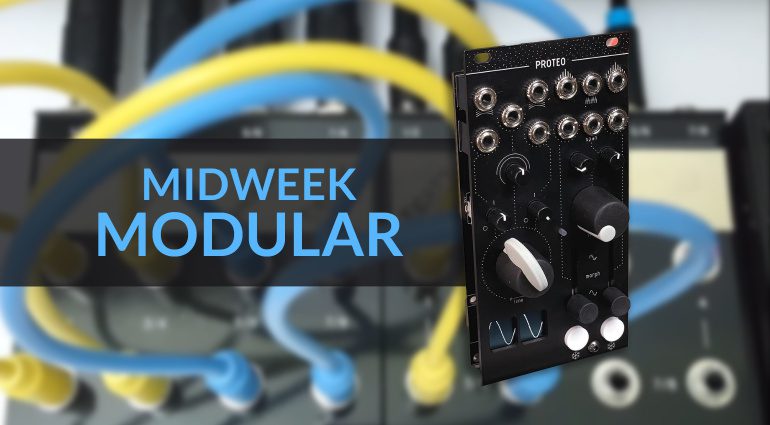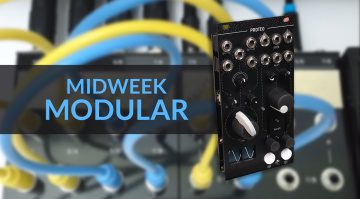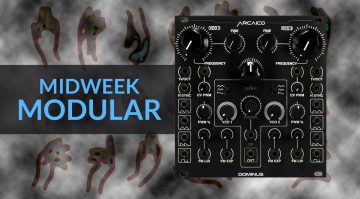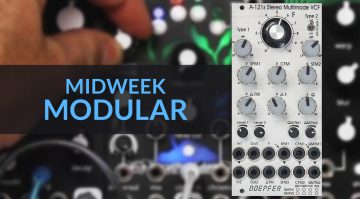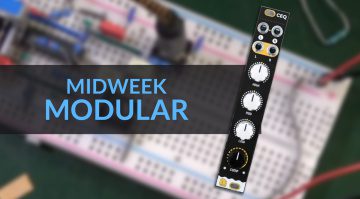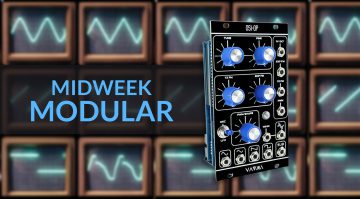Midweek Modular: Nanopatching, ShapeShifting and You Only Distort Once
This week DF Audio gives us a tiny patchbay, Clank has a shape-shifting stereo oscillator and Manifold Research Centre distorts and generates with polyphonic channels of tap-tempo modulations.
With Barcelona Modular Day this weekend and Bristronica and SynthFest fast approaching, many potential releases are being kept close to the chest. However, leaving rumours and teases aside, I was able to dig up a few things.
Midweek Modular
Here are this week’s rainbow sprinkles scattered on the top of your favourite modular ice cream. Are these your crumbliest, flakiest modular moments?
DF Audio Nanopatch
Kicking off with something that’s not modular per se but could be an extremely useful utility for your modular, DAWless or desktop system. DF Audio has been making some very useful patchbays. These are usually desktop-based and provide an uncommon amount of usefulness. The general idea is that they make it so much easier to patch your gear into effects pedals, boxes and modulations.
The latest boxes are super-compact and look perfect for modest desktop setups or Eurorack. There are two versions. X has 1/4″ TRS sockets designed for pedals. M has mini-jacks to make it ideal for small instruments or modular connections. They can handle CV or audio.
Rather than try to explain how the connections work or why they are useful, I will direct you to this nicely put-together video. The Nanopatch X and M will be available in November.
You are currently viewing a placeholder content from YouTube. To access the actual content, click the button below. Please note that doing so will share data with third-party providers.
Clank Proteo
We first saw the Proteo oscillator from Clank Modular at Superbooth back in May. Clank tells us that it’s now available for preorder for €350. Let’s give it another look.
Clank calls it a shape-shifting stereo oscillator. Proteo is a shape-shifter from Greek mythology who assumes whatever shapes he prefers. The Proteo module does something similar in that its tonal palette depends on what’s being fed into it. It sort of records incoming voltages and generates distinct waveforms from them. You can then explore what happens when you alter the time, source material and morphing parameters. Sounds evolve from the continuous sampling of the inputs and can then morph to and from the internal sine waves. The two oscillators are tied to the same v/oct and pitch controls but can be pushed apart by detuning.
It’s a really interesting module with a huge range of tones. It has a wavetable vibe but one that’s not content to stay within its table. Currently, the only videos of it in action are via Instagram, but I think you’ll find it quite illuminating.
You are currently viewing a placeholder content from Default. To access the actual content, click the button below. Please note that doing so will share data with third-party providers.
Manifold Research Centre Delta^ and Yodo
There’s some kind of other dimension stuff going on in the unfathomable depths of the Manifold Research Centre. If you can work out how to navigate their fascinatingly opaque website, you might stumble across two new modules.
Delta^, which also seems to be a donut, is a striking-looking polyphonic CV and clock generator. It has a grid of 9 independent mechanical keyboard keys. Each one can be a tap-tempo generator of time with its own output. The top 3 handle CV, the rest kick out gates. You can alter phase, shape them in LFOs or modulate the pulse width, and you can divide and multiply. There are CV inputs for a bit of control, you can use a gravitational mode to pull taps towards and away from each other, and you can add a layer of randomisation.
What’s interesting is how you generate the CV and gates by simply tapping the keys – it’s ridiculously simple and I can’t believe I haven’t really come across it built into a module like this before. You can tie keys together using copy/paste or hold everything to an external clock. Fascinating and weird.
You are currently viewing a placeholder content from YouTube. To access the actual content, click the button below. Please note that doing so will share data with third-party providers.
Yodo stands for You Only Distort Once and is a distortion module based on CMOS hex inverters. It has some EQ and a built-in VCA with a CV controllable feedback path. How does it sound? EPIC!
You are currently viewing a placeholder content from YouTube. To access the actual content, click the button below. Please note that doing so will share data with third-party providers.
- Manifold Research Centre website.
Gregsbrain XVOX Harmonic Pitch Shifter DIY kit
In other news, the XVOX Harmonic Pitch Shifter is now available as a kit. We talked about this module back in July. It’s a four-channel real-time pitch shifter that can take an audio input from your oscillator and generate a whole chordal structure around it. It wasn’t that easy to explain but Greg Burns has come up with a better video that opens it up a bit more.
You are currently viewing a placeholder content from YouTube. To access the actual content, click the button below. Please note that doing so will share data with third-party providers.


 3,4 / 5,0 |
3,4 / 5,0 | 